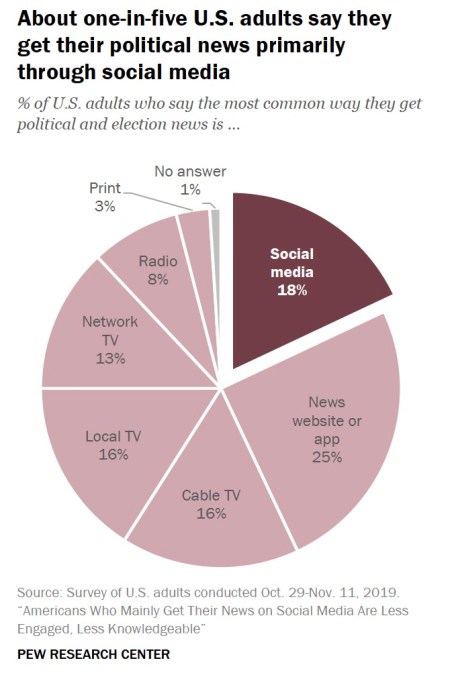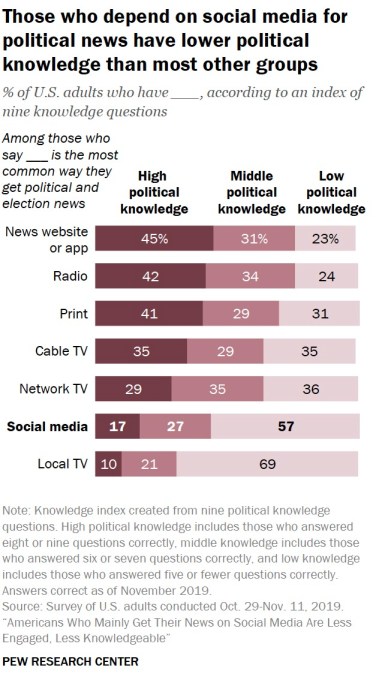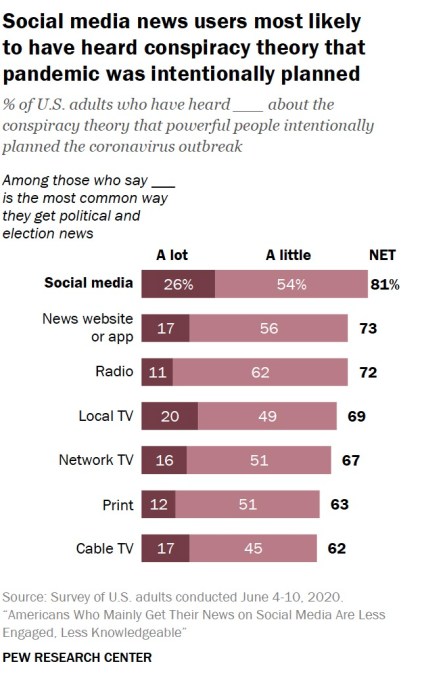https://www.theguardian.com/australia-news/2021/feb/24/sky-news-australia-is-tapping-into-the-global-conspiracy-set-and-its-paying-off
Jones uses segments from Sky News Australia in his program, particularly those from Sky’s Outsiders program, as “evidence” from mainstream media organisations to support his conspiracy theories.
The bite-sized videos carry advertising – and Sky shares the revenue with platforms like YouTube.
Last November, tech journalist Cam Wilson revealed in Business Insider that Sky News Australia had successfully built a Fox News-like online operation in Australia that dwarfs its terrestrial audience numbers. On YouTube, their videos have been viewed more than 500m times, more than any other Australian media organisation.
Wilson also reported that Sky’s Facebook posts had more total interactions in October than the ABC News, SBS News, 7News Australia, 9 News and 10 News First pages, and more shares than all of them combined.
++++++++++++++
more on conspiracy theories in this IMS blog
https://blog.stcloudstate.edu/ims?s=conspiracy+theories
Information Media and Digital Literacy for GLST 195: Global Society & Citizenship
Instructor: Prof. Chuks Ugochukwu Per Syllabus:
COURSE LEARNING OUTCOMES:
The course meets Liberal Education Program (LEP), Goal Area 8: Global Perspective; and Goal Area 9: Ethical and Civic Responsibility objectives
Goal Area 8: Global Perspective. Objective: Develop a comparative perspective and understanding of one’s place in a global context.
Students will be able to:
- Describe and analyze political, economic, and cultural elements which influence relations of states and societies in their historical and contemporary dimensions.
- Demonstrate knowledge of cultural, social, religious and linguistic differences.
- Analyze specific international problems, illustrating the cultural,economic, and political differences that affect their solution.
- Understand the role of a world citizen and the responsibility world citizens share for their common global future.
Goal Area 9: Ethical and Civic Responsibility Objective: Understand and evaluate ethical or civic issues and theories and participate in active citizenship or ethical judgment
OUR HUSKY COMPACT
Our Husky Compact is a bond shared by St. Cloud State University and its students that a SCSU education will prepare students for a life of growth and fulfillment – intellectually, professionally, and personally. When students graduate with an SCSU education, they will:
- Think Creatively and Critically
- Seek and Apply Knowledge
- Communicate Effectively
- Integrate Existing and Evolving Technologies
- Engage as a Member of a Diverse and Multicultural World
- Act with Personal Integrity and Civic Responsibility
+++++++++++++++++++++
Week ???: Information – Media and Digital Literacy
Most students can’t tell fake news from real news, study shows
Read more: https://blog.stcloudstate.edu/ims/2017/03/28/fake-news-3/
Module 1
video to introduce students to the readings and expected tasks
https://mediaspace.minnstate.edu/media/GLST+195+Module+1/1_32242qua
- Fake News / Misinformation / Disinformation
- Definitions
- Fake news, alternative facts
https://blog.stcloudstate.edu/ims?s=fake+news
https://blog.stcloudstate.edu/ims?s=alternative+facts
Mini-Assignment: After reading the information from the links above, take a minute to write out your own definition of 1. Fake News 2. Alternative Facts
-
-
- Misinformation vs disinformation
https://blog.stcloudstate.edu/ims/2018/02/18/fake-news-disinformation-propaganda/
Mini-Assignment: After reading the information from the links above, take a minute to write out your own definition of 1. Misinformation 2. Disinformation. What are their main characteristics? How do they differ?
-
-
-
- Propaganda
Mini-Assignment: What is Propaganda? How do misinformation, disinformation, fake news and alternative facts fit into the process of propaganda?
-
-
-
- Conspiracy theories
https://blog.stcloudstate.edu/ims?s=conspiracy+theories
Mini-Assignment: Using the information from the links above, can you establish the connection between conspiracy theories, propaganda, mis- and disinformation, fake news, alternative news and social media?
-
-
-
-
- Bots, trolls
https://blog.stcloudstate.edu/ims/2017/11/22/bots-trolls-and-fake-news/
https://blog.stcloudstate.edu/ims/2020/04/30/fake-social-media-accounts-and-politicians/
https://blog.stcloudstate.edu/ims/2020/01/20/bots-and-disinformation/
Mini-Assignment: using the info from the links above and/or information you have collected, can you define the role of bots and trolls in social media in regard to propaganda and conspiracy theories?
-
-
-
- Clickbait
Filter bubbles, echo chambers
(8 min) video explains filter bubbles
https://www.ted.com/talks/eli_pariser_beware_online_filter
Mini-Assignment:: based on your own information and experience, as well as the information offered in the links, can you define your own resistance to clickbaits?
Assignment: which challenges do you identify with?
The Challenge of Teaching News Literacy:
https://soundcloud.com/edsurge/the-challenge-of-teaching-news-literacy
25 min podcast.
In a short paragraph, identify the issues you see as important to address in order to improve your own news literacy.
time to accomplish the assignment: ~45 min (including listening to the podcast).
- Why is it important to understand these processes?
Assignment: why is it important:
In a short paragraph, share your initial feeling about Fake News / Misinformation / Disinformation. 1. Do you think, it is important at all? 2. If yes, why; if not, why. 3. If yes, what is the importance, the impact?
time to accomplish the assignment: ~5-10 min
- How to deal with these processes
- how do we apply hands-on critical thinking to withstand these processes?
- What is critical thinking
disciplined thinking that is clear, rational, open-minded, and informed by evidence: https://www.dictionary.com/browse/critical-thinking
- Ability to research
Ability to find reliable information
- Popular media
How to spot fake news:
https://blog.stcloudstate.edu/ims/2017/03/15/fake-news-bib/
Can machines create fake news?
https://blog.stcloudstate.edu/ims/2019/10/24/fake-news-generator/
Can machines “clean up” fake from real?
https://blog.stcloudstate.edu/ims/2020/11/16/identifying-fake-news-by-90/
What can humans do to distinguish fake from real? Consider these five factors:
https://blog.stcloudstate.edu/ims/2017/06/26/fake-news-real-news/
Considering the second factor (who published it), here is a scale to consider when evaluating the veracity of your sources:
https://blog.stcloudstate.edu/ims/2017/08/13/library-spot-fake-news/
(can you find your favorite magazine/newspaper on the graphic?)
https://blog.stcloudstate.edu/ims/2016/12/14/fake-news-2/
(can you find your favorite news organization on the graphic?)
Factcheckers/Factchecking Organizations:
https://blog.stcloudstate.edu/ims/2017/03/28/fake-news-resources/
https://blog.stcloudstate.edu/ims/2016/12/14/fake-news-2/
- Peer-reviewed literature
Similarly to the assessment of popular information sources, academia requires vigorous vetting if the sources you will be using for your academic work. In the 21st century, your ability to find information in peer-reviewed journals might not be sufficient to assure accurate and reliable use of information from those resources for your research and writing. After your selection of peer-reviewed literature, you must be able to evaluate and determine the veracity and reliability of those sources.
How do you evaluate a source of information to determine if it is appropriate for academic/scholarly use. There is no set “checklist” to complete but below are some criteria to consider when you are evaluating a source.
Here is a short (4 min) video introducing you to the well-known basics for evaluation of academic literature:
https://youtu.be/qUd_gf2ypk4
- ACCURACY
- Does the author cite reliable sources?
- How does the information compare with that in other works on the topic?
- Can you determine if the information has gone through peer-review?
- Are there factual, spelling, typographical, or grammatical errors?
- AUDIENCE
- Who do you think the authors are trying to reach?
- Is the language, vocabulary, style and tone appropriate for intended audience?
- What are the audience demographics? (age, educational level, etc.)
- Are the authors targeting a particular group or segment of society?
- AUTHORITY
- Who wrote the information found in the article or on the site?
- What are the author’s credentials/qualifications for this particular topic?
- Is the author affiliated with a particular organization or institution?
- What does that affiliation suggest about the author?
- CURRENCY
- Is the content current?
- Does the date of the information directly affect the accuracy or usefulness of the information?
- OBJECTIVITY/BIAS
- What is the author’s or website’s point of view?
- Is the point of view subtle or explicit?
- Is the information presented as fact or opinion?
- If opinion, is the opinion supported by credible data or informed argument?
- Is the information one-sided?
- Are alternate views represented?
- Does the point of view affect how you view the information?
- PURPOSE
- What is the author’s purpose or objective, to explain, provide new information or news, entertain, persuade or sell?
- Does the purpose affect how you view the information presented?
In 2021, however, all suggestions above may not be sufficient to distinguish a reliable source of information, even if the article made it through the peer-reviewed process. In time, you should learn to evaluate the research methods of the authors and decide if they are reliable. Same applies for the research findings and conclusions.
Assignment: seeking reliable information
From your syllabus weekly themes: 1. Food; 2. Health; 3. Energy; 4. Environment; 5. Security, chose a topic of your interest.
For example: Food: raising cattle for food contributes to climate changes, because of the methane gas, or Health: COVID is the same (or not the same) as the flu; or Energy: Fossil energy is bad (or good) for the environment; etc.
Please consult with me (email me for a zoom appointment: pmiltenoff@stcloudstate.edu), if you need to discuss the choice and narrowing down of the topic.
Once you decide on the topic, do the research by collecting four sources of information:
The first couple of sources will be from popular media, whereas each of the two articles will be having an opposite approach, arguments and understanding of the issue. For example, one article will claim fossil energy is bad for the environment and the other one will argue fossil fuel has insignificant impact on climate change. You must be able to evaluate the veracity and the leaning of each source. The source can be a newspaper or magazine article, video (TV or Social Media), audio (podcasts, TV, etc.), presentations (PowerPoint, SlideShare, etc.).
Having troubles finding opposing resources? Feel welcome to search for your topic among these news outlets on the conservative side:
https://www.conservapedia.com/Top_Conservative_news_websites
and the https://aelieve.com/rankings/websites/category/news-media/top-liberal-websites/
In the same fashion, you will evaluate the second couple of sources from peer-reviewed journals. Each source will have different approach, argument and understanding of the issue and you must evaluate the robustness of the research method.
time to accomplish the assignment: ~30 min
Module 2 (video to introduce students to the readings and expected tasks)
- Digital Citizenship, Global Citizenship and Multiculturalism
- Definitions
- Global Citizenship
seek global sources:
start reading:
e.g. start following and reading several news outlets from other countries and with time, you should be able to detect differences in opinions and facts presented at those outlets and your current sources for information:
Spiegel International (German, left-leaning)
https://www.facebook.com/spiegelinternational
Le Monde Diplomatique
https://www.facebook.com/mondediplo
El Pais (Spanish, left leaning)
https://www.facebook.com/elpaisinenglish
Moscow Times (Russian, left leaning)
https://www.facebook.com/MoscowTimes
The Epoch Times (Chinese, far-right)
https://www.theepochtimes.com/
Start watching (smart phone, laptop) news feeds, live or vlog (video blog):
Africa News
https://youtu.be/NQjabLGdP5g
Nigeria Live (you can seek any other country on YouTube by typing the name of the country adding “live”)
https://youtu.be/ATJc9LyPZj8
Al Jazeera in English
https://youtu.be/GXfsI-zZO7s
Deutsche Welle
https://www.youtube.com/user/deutschewelleenglish
BBC
https://www.youtube.com/user/bbcnews
Russia Today
https://www.youtube.com/user/RussiaToday
China Today
https://www.youtube.com/channel/UCBOqkAGTtzZVmKvY4SwdZ2g
India News
https://www.youtube.com/user/IndiaTV
you can also follow specific people’s vlogs, e.g.
Alexei Navalny’s vlog has English subtitles
https://www.youtube.com/user/NavalnyRu
France 24 Live
https://youtu.be/HeTWwH1a0CQ
Start listening (smart phone, laptop):
BBC
https://play.google.com/store/apps/details?id=uk.co.bbc.android.iplayerradio&hl=en_US&gl=US (Android app)
https://apps.apple.com/gb/app/bbc-sounds/id1380676511 (iOS app)
Deutsche Welle
https://play.google.com/store/apps/details?id=com.exlivinapps.deutschewelleradioappde&hl=en_US&gl=US (Android app)
https://apps.apple.com/us/developer/deutsche-welle/id305630107 (iOS app)
Assignment:
Global Citizenship and Multiculturalism and Information and Media Literacy
Study the following tweet feed
https://blog.stcloudstate.edu/ims/2021/02/18/facebook-google-australia/
If the information from the tweet feed is insufficient, research the issue by seeking reliable sources. (In a short paragraph defend your choice of reliable sources).
What do you see as more important issue: the Facebook stance that it can be a subject of Australian law or the Australian government stance that Facebook is interfering in Australian life with its news delivery? Is Facebook a news outlet or a platform for news outlets? Does Facebook need to be regulated? By who; each country do have to regulate Facebook or Facebook needs to be regulated globally?
time to accomplish the assignment: ~30 min
Module 3 (video to introduce students to the readings and expected tasks)
- Assistance for work on the final project / paper
++++++++++++++++++++++++++
Here a list of additional materials and readings on Fake News
https://www.ted.com/talks/eli_pariser_beware_online_filter
https://www.spiegel.de/international/business/interview-with-washington-post-editor-martin-baron-we-had-to-be-much-more-forthright-about-trump-a-2d5b7c59-7024-4138-91bc-0cc3b54d3794
DER SPIEGEL: Trump attacked the Post frequently during his presidency. For you personally, what was the most noteworthy moment with him?
Baron: It was the first time he used the phrase “enemy of the people”. It was shocking. It’s a phrase that has obviously been used in other contexts in the worst possible way …
DER SPIEGEL: … during the Third Reich, for example, Hitler’s regime used that term to persecute political enemies.
Baron: You’re making an analogy there to what ultimately transpired in Germany, but I’m not ready to go that far just yet. It was clear that he was going to go to the extreme to demonize us. He endeavored to portray us as garbage, as scoundrels. And he has done, I have to say, a very effective job of turning people against us. That was the objective, to get his followers to ignore whatever we wrote and to view whatever we wrote as a product of the opposition. He wanted to portray us as the opposition party. He has been largely successful in achieving that. He wouldn’t stop even if it posed the risk of violence against journalists, and it has resulted in violence and threats against journalists.
My note: the even more appropriate analogy would be actually with Stalin’s purges, where not only high-ranking Party’ officials, but regular people were condemned as “enemy of the people” and either death-sentenced or banished in the Gulag. #populism
++++++++++++
more on fake news in this IMS blog
https://blog.stcloudstate.edu/ims?s=fake+news
more on social media in this IMS blog
https://blog.stcloudstate.edu/ims?s=social+media
WhatsApp loses millions of users after terms update from r/worldnews
https://www.theguardian.com/technology/2021/jan/24/whatsapp-loses-millions-of-users-after-terms-update
A poorly explained update to its terms of service has pushed WhatsApp users to adopt alternative services such as Signal and Telegram in their millions.
Apps like Signal, Telegram, Wickr, and WhatsApp offer privacy features ranging from end-to-end encrypted data transfer to ‘self-destructing messages’.”
++++++++++++
Fast-Growing Alternative To Facebook And Twitter Finds Post-Trump Surge ‘Messy’
https://www.npr.org/2021/01/22/958877682/fast-growing-alternative-to-facebook-twitter-finds-right-wing-surge-messy
MeWe markets itself as privacy forward. It doesn’t harness users’ data to sell ads or decide what content to show them. My note: but has to charge somehow, so, differently from FB Messenger, one needs to pay, in order to do audio call in MeWe.
MeWe’s Weinstein resists the comparison to Parler or Gab, which tout themselves as free-speech sites. For one thing, he says, MeWe is serious about putting limits on what people can say.
The tech website OneZero uncovered right-wing militia groups on MeWe as well as a “Stop the Steal” group that discussed shooting people. The company removed the groups after OneZero flagged them.
“I think we all still treat social media companies like they’re these inexpensive startups, but maybe they need to be treated more like starting an airplane company or a company that makes cars,” said Megan Squire, a professor at Elon University who studies online extremists. “You’ve got to think about seat belts.”
++++++++++++
more on social media in this IMS blog
https://blog.stcloudstate.edu/ims?s=social+media
Pew research: Tech experts believe social media is harming democracy from r/technology
https://www.pewresearch.org/internet/2020/02/21/many-tech-experts-say-digital-disruption-will-hurt-democracy/
The years of almost unfettered enthusiasm about the benefits of the internet have been followed by a period of techlash as users worry about the actors who exploit the speed, reach and complexity of the internet for harmful purposes. Over the past four years – a time of the Brexit decision in the United Kingdom, the American presidential election and a variety of other elections – the digital disruption of democracy has been a leading concern.
Some think the information and trust environment will worsen by 2030 thanks to the rise of video deepfakes, cheapfakes and other misinformation tactics.
Power Imbalance: Democracy is at risk because those with power will seek to maintain it by building systems that serve them not the masses. Too few in the general public possess enough knowledge to resist this assertion of power.
EXPLOITING DIGITAL ILLITERACY
danah boyd, principal researcher at Microsoft Research and founder of Data & Society, wrote, “The problem is that technology mirrors and magnifies the good, bad AND ugly in everyday life. And right now, we do not have the safeguards, security or policies in place to prevent manipulators from doing significant harm with the technologies designed to connect people and help spread information.”
+++++++++++++++
more on social media in this IMS blog
https://blog.stcloudstate.edu/ims?s=social+media


